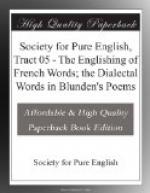ON THE DIALECTAL WORDS IN EDMUND BLUNDEN’S POEMS[3]
[Footnote 3: The Waggoner and other Poems, by Edmund Blunden, pp. 70. Sidgwick and Jackson. London, 1920.]
In the original prospectus of the S.P.E., reprinted in Tract I, and again in III, p. 9, one of the objects of the Society is stated to be the ’enrichment and what is called regeneration of the language from the picturesque vocabularies of local vernaculars’. Since a young poet, Mr. Edmund Blunden, has lately published a volume in which this particular element of dialectal and obsolescent words is very prominent, it will be suitable to our general purpose to consider it as a practical experiment and examine the results. The poetic diction and high standard of his best work give sufficient importance to this procedure; and though he may seem to be somewhat extravagant in his predilection for unusual terms, yet his poetry cannot be imagined without them, and the strength and beauty of the effects must be estimated in his successes and not in his failures.
In the following remarks no appreciation of the poetry will be attempted: our undertaking is merely to tabulate the ‘new’ words, and examine their fitness for their employment. The bracketed numbers following the quotations give the page of the book where they occur. The initials O.E.D. and E.D.D. stand for the Oxford English Dictionary and the English Dialect Dictionary (Wright).
1. ‘And churning owls and goistering daws’. (1)




